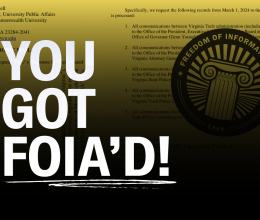
Virginia Civil Liberties Group Says Student’s Right to Hand Out Literature Probably Protected by First Amendment of the Constitution
Concerned that an Augusta County student’s First Amendment rights may have been violated when she was suspended for handing out religious tracts at school, the ACLU of Virginia today send a Freedom of Information Act request to the school’s principal. In addition to seeking written materials, such as policies covering distribution of materials at school, the ACLU has also asked for a full accounting of the incident.
Accounts of the situation have varied. Initially, it appeared that Fort Defiance High School officials disciplined 15 year-old sophomore Samantha Weatherholtz solely because the materials she handed out to other students were about religion. If that were this the case, the school certainly violated Weatherholtz’s constitutional rights when it disciplined her.
School officials later said that Weatherholtz was suspended not because of the religions subject matter of the literature, but because she violated school policy by failing to obtain permission from school officials before distributing the literature. Weatherholtz’s mother, however, has said that her daughter was not aware of any such requirement and that her daughter delivered copies of the literature to the principal’s office.
“Under most circumstances, students have a constitutional right to hand out literature at school, whether or not the subject addressed is religion,” said ACLU of Virginia executive director Kent Willis. “However, because there are some limitations on students’ free speech rights, it is important to know exactly what happened at Fort Defiance High School .”
“First, we want to see the written policy regarding distribution of materials at school and we want to know if it were actually distributed to students and their parents,” added Willis. “If students were not made aware or the policy, they could hardly be expected to follow it.”
“Second, even if the policy were distributed to students, it may be unconstitutional. An overly strict school policy that requires all literature under all circumstances to be first approved by school officials may be unenforceable.”
“It is also important to know how the school has handled distribution of materials by students in the past,” continued Willis. “For example, did the school apply a different standard to Ms. Weatherholdtz because she handed out religious literature? Have other students been allowed to hand out non-religious materials without first getting permission?
Contact: Kent Willis, 804-644-8022




